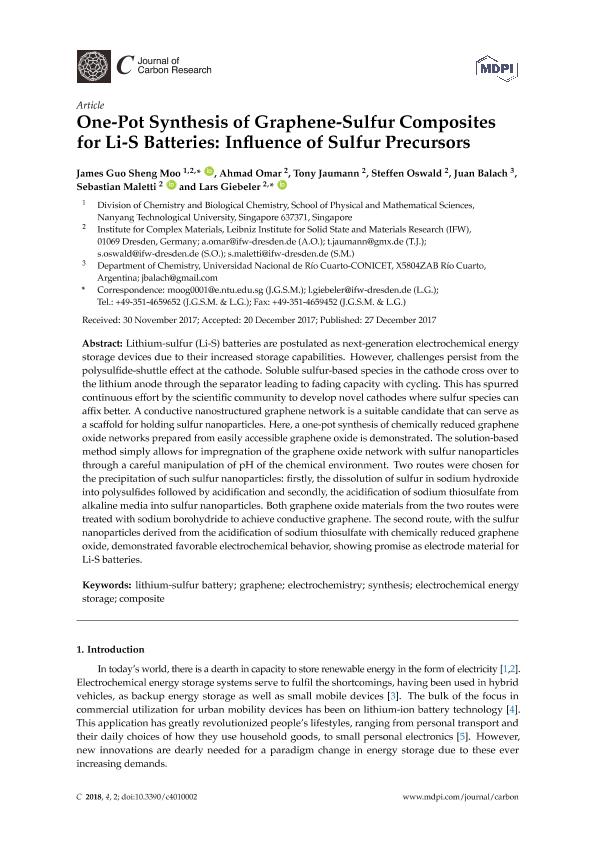Mostrar el registro sencillo del ítem
dc.contributor.author
Sheng Moo, James Guo
dc.contributor.author
Omar, Ahmad
dc.contributor.author
Jaumann, Tony

dc.contributor.author
Oswald, Steffen
dc.contributor.author
Balach, Juan Manuel

dc.contributor.author
Maletti, Sebastian
dc.contributor.author
Giebeler, Lars

dc.date.available
2021-06-07T03:53:51Z
dc.date.issued
2017-12-27
dc.identifier.citation
Sheng Moo, James Guo; Omar, Ahmad; Jaumann, Tony; Oswald, Steffen; Balach, Juan Manuel; et al.; One-pot synthesis of graphene-sulfur composites for Li-S batteries: influence of sulfur precursors; Multidisciplinary Digital Publishing Institute; C: Journal of Carbon Research; 4; 1; 27-12-2017; 1-17
dc.identifier.uri
http://hdl.handle.net/11336/133295
dc.description.abstract
Lithium-sulfur (Li-S) batteries are postulated as next-generation electrochemical energy storage devices due to their increased storage capabilities. However, challenges persist from the polysulfide-shuttle effect at the cathode. Soluble sulfur-based species in the cathode cross over to the lithium anode through the separator leading to fading capacity with cycling. This has spurred continuous effort by the scientific community to develop novel cathodes where sulfur species can affix better. A conductive nanostructured graphene network is a suitable candidate that can serve as a scaffold for holding sulfur nanoparticles. Here, a one-pot synthesis of chemically reduced graphene oxide networks prepared from easily accessible graphene oxide is demonstrated. The solution-based method simply allows for impregnation of the graphene oxide network with sulfur nanoparticles through a careful manipulation of pH of the chemical environment. Two routes were chosen for the precipitation of such sulfur nanoparticles: firstly, the dissolution of sulfur in sodium hydroxide into polysulfides followed by acidification and secondly, the acidification of sodium thiosulfate from alkaline media into sulfur nanoparticles. Both graphene oxide materials from the two routes were treated with sodium borohydride to achieve conductive graphene. The second route, with the sulfur nanoparticles derived from the acidification of sodium thiosulfate with chemically reduced graphene oxide, demonstrated favorable electrochemical behavior, showing promise as electrode material for Li-S batteries.
dc.format
application/pdf
dc.language.iso
eng
dc.publisher
Multidisciplinary Digital Publishing Institute
dc.rights
info:eu-repo/semantics/openAccess
dc.rights.uri
https://creativecommons.org/licenses/by/2.5/ar/
dc.subject
LITHIUM-SULFUR BATTERY
dc.subject
GRAPHENE
dc.subject
ELECTROCHEMISTRY
dc.subject
COMPOSITE
dc.subject
SYNTHESIS
dc.subject
ELECTROCHEMICAL ENERGY STORAGE
dc.subject.classification
Físico-Química, Ciencia de los Polímeros, Electroquímica

dc.subject.classification
Ciencias Químicas

dc.subject.classification
CIENCIAS NATURALES Y EXACTAS

dc.title
One-pot synthesis of graphene-sulfur composites for Li-S batteries: influence of sulfur precursors
dc.type
info:eu-repo/semantics/article
dc.type
info:ar-repo/semantics/artículo
dc.type
info:eu-repo/semantics/publishedVersion
dc.date.updated
2021-06-02T12:14:54Z
dc.identifier.eissn
2311-5629
dc.journal.volume
4
dc.journal.number
1
dc.journal.pagination
1-17
dc.journal.pais
Suiza

dc.journal.ciudad
Basel
dc.description.fil
Fil: Sheng Moo, James Guo. Nanyang Technological University; Singapur. Leibniz Institute for Solid State and Materials Research. Institute for Complex Materials; Alemania
dc.description.fil
Fil: Omar, Ahmad. Leibniz Institute for Solid State and Materials Research. Institute for Complex Materials; Alemania
dc.description.fil
Fil: Jaumann, Tony. Leibniz Institute for Solid State and Materials Research. Institute for Complex Materials; Alemania
dc.description.fil
Fil: Oswald, Steffen. Leibniz Institute for Solid State and Materials Research. Institute for Complex Materials; Alemania
dc.description.fil
Fil: Balach, Juan Manuel. Universidad Nacional de Río Cuarto. Facultad de Ciencias Exactas Fisicoquímicas y Naturales. Departamento de Química; Argentina. Consejo Nacional de Investigaciones Científicas y Técnicas. Centro Científico Tecnológico Conicet - Córdoba; Argentina
dc.description.fil
Fil: Maletti, Sebastian. Leibniz Institute for Solid State and Materials Research. Institute for Complex Materials; Alemania
dc.description.fil
Fil: Giebeler, Lars. Leibniz Institute for Solid State and Materials Research. Institute for Complex Materials; Alemania
dc.journal.title
C: Journal of Carbon Research
dc.relation.alternativeid
info:eu-repo/semantics/altIdentifier/doi/http://dx.doi.org/10.3390/c4010002
dc.relation.alternativeid
info:eu-repo/semantics/altIdentifier/url/http://www.mdpi.com/2311-5629/4/1/2
Archivos asociados
